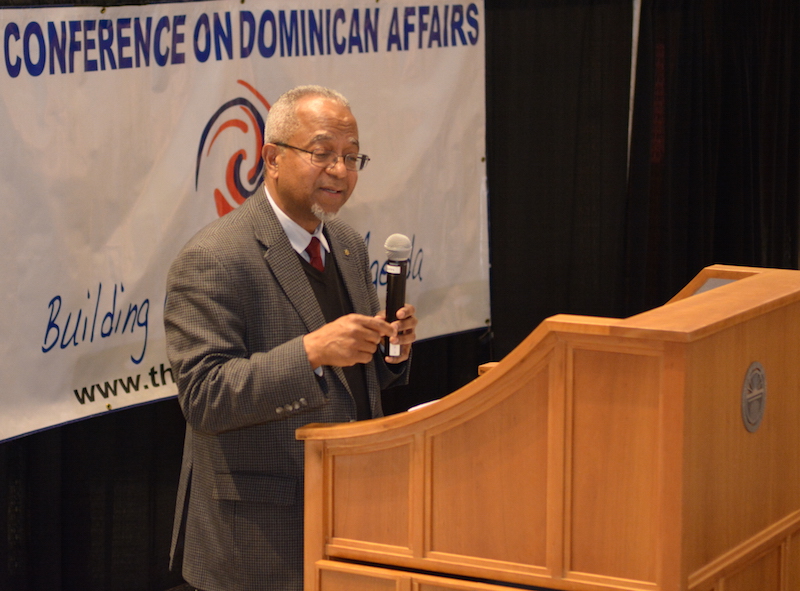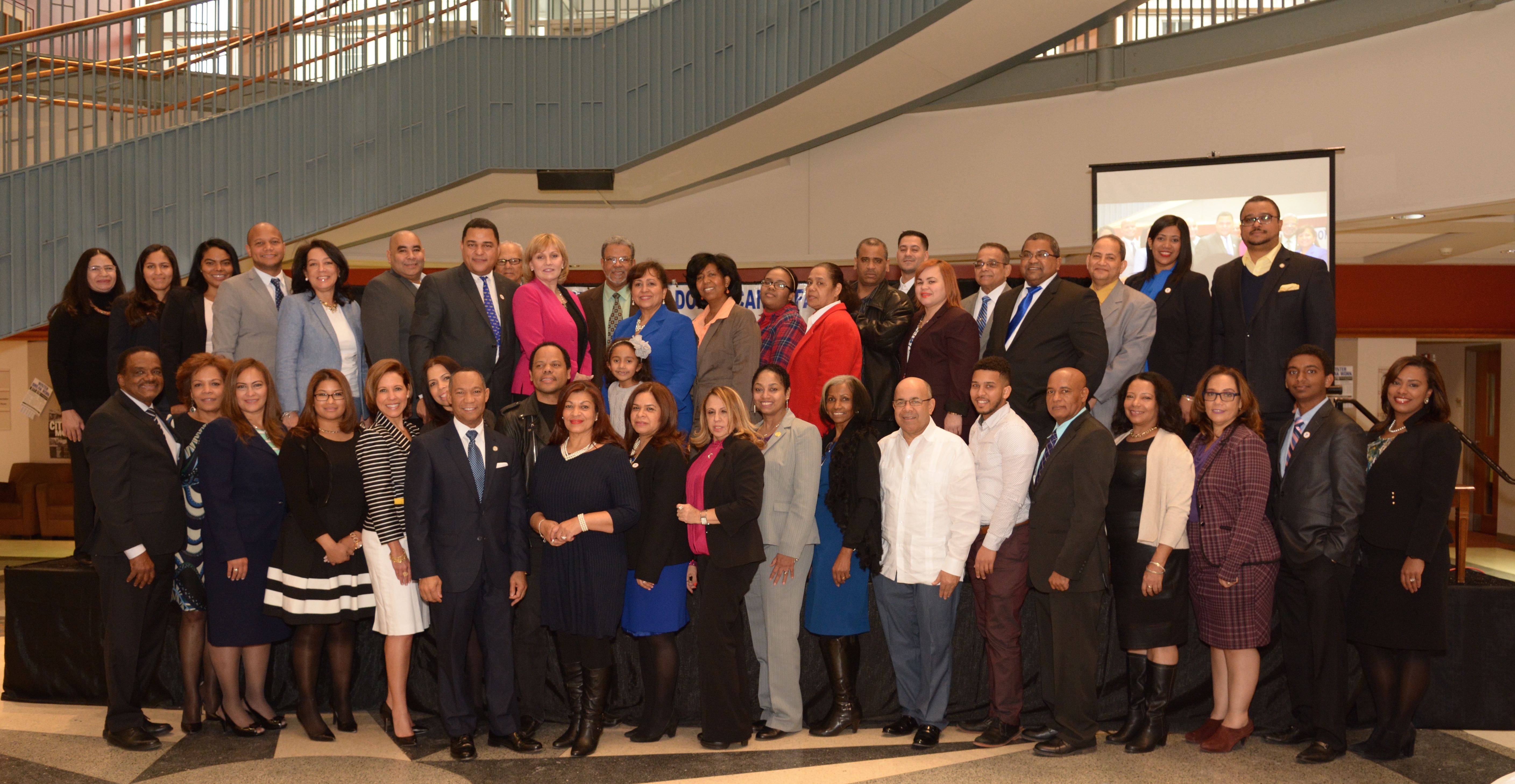
In-depth Report
by The Institute for Latino Studies, Research and Development
on
17th Conference on Dominican Affairs
at Rutgers School of Law
on Sunday, February 12, 2017, 9am to 4pm
Conference Succeeds at Facilitating Discourse on the Present & Future of US Dominicans
Keynote Speaker Affirms Dominicans are Black too and shouldn’t be barred from membership in the US Black Congressional Caucus
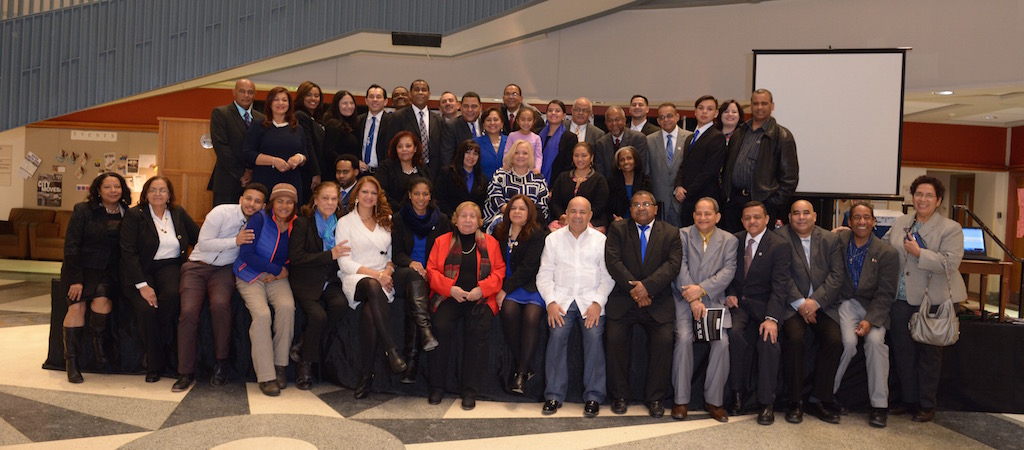
The Conference on Dominican Affairs (CODA), a signature event of the Institute for Latino Studies, succeeded once more at its role of serving as the only, and most powerful state-wide annual event in the Latino and Dominican American calendar in USA. CODA afforded hundreds of participants the opportunity to dialogue and strategize for community empowerment and advancement.
With the theme Claiming Our Legacy in USA, the 17th Annual Conference offered an inspiring and uplifting program of workshops, meetings and plenary sessions to the benefit of participants who, in spite of adverse weather conditions made it to Rutgers School of Law in Newark, NJ. 
“CODA 2017 was one of the most productive and rewarding installments since its inception seventeen years ago,” said Dr. Maria Teresa Montilla, President of the Institute for Latino Studies, Research and Development, which hosts the conference. “People came from near and far to participate. On behalf of our Board of Directors, volunteers, UNIVISION and sponsoring partners, I thank you for your continuous support and participation. We’ll see you on Sunday, February 11, 2018 as we celebrate the 18th Anniversary of the Conference on Dominican Affairs.”

“We would like to thank all volunteers as well, such as Heidy Hernandez, Doris Ramos, Juan Familia, Rosa Scelti, Pedro Valerio, Alexander Garcia, Manuel Valle, Rebeca Goetz, Fausto Hernandez, Adenalina Familia, Ailin Rivera and particularly the extraordinary work and dedication of the Latino Leadership Academy fellows who diligently spent the day moderating, facilitating and ensuring the conference was successful,” said Nestor Montilla, Sr. “I would like to particularly congratulate the following fellows: Rev. Juan Rosario, Rev. Cleo Santiago, Rev. Fernando Plaza, Carla Jiménez, Eloisa Mercedes, Cathy Polanco, Sandra Batres, Rossana Genao, Miriam Younan, Maria Isabel Alarcon, Carlos Salinas, Alex Calixto Rodríguez, Gino Hernández, Sebastián Rodríguez, Elvin Dominicci, Erick Cedano, Manny Martínez, Jr., José Colon and Edwin Matias. They acquired hands-on experience on coordinating a state-wide leadership conference such as CODA.”
This year, CODA program included both annual meetings of the Dominican American National Roundtable (DANR) and the National Dominican American Council (NDAC). Board members of these two organizations contributed with their presence and participation as panelists and volunteers as well.
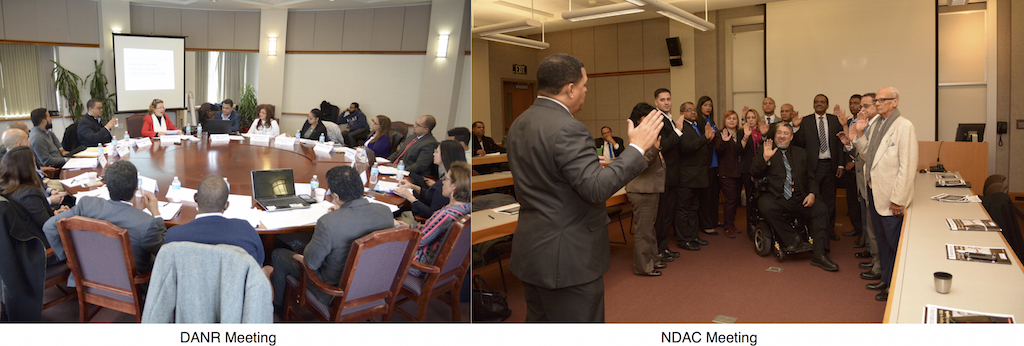
On Sunday, February 12th, the Conference opened with a plenary breakfast to discuss migration and social policy formulation in the Dominican Republic. Presenters included Alexis Lantigua, Vice Ministro de Politica Social Exterior, Dominican Republic, Dr. Irma Nicasio, Universidad Autónoma de Santo Domingo & Advisor to DR Senate, Ms. Florinda Rojas, Executive Director, Instituto National de Migración, Dominican Republic, and DR Consul General in New York Carlos Castillo. This forum was moderated by Nestor Montilla, Sr., Chairman of the Dominican American National Roundtable.
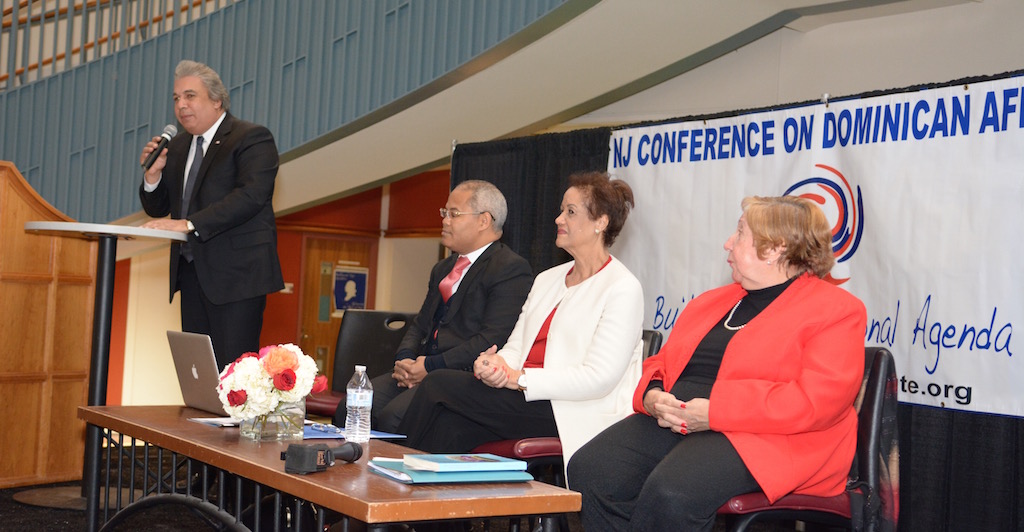
This year’s program included four concurrent workshops in the morning:
The workshop on Women in Politics considered the journey of women into the political arena, the high number of women elected to public office in the last ten years, possible reasons, as well as the innovative campaign strategies used.

Participating panelists and speakers included Puerto Rico Legislator Claribel Martínez-Marmolejos, Rhode Island Senator Ana Quezada, New York Senator Marisol Alcántara, Maryland Delegate Joseline Peña-Melnyk, Former West New York Commissioner Fior D’Aliza Frías, Florida State Representative Daisy Baez, New York District Leader Yudelka Tapia, former PR legislator Ana Marchena, Ph.d., New Jersey Bethania Marmolejos, Lydia Valencia, Elis Sosa, Eloísa Mercedes, Miriam Younan, Rossana Genao, and Carla Jiménez. All shared their experiences, thoughts, and suggestions on women empowerment and leadership. Lieutenant Governor Kim Guadagno addressed the group with words of encouragement and solidarity. Most agreed that to successfully run for office it is of utmost importance to secure support from friends, family members and most importantly from their husbands.
The conclusion of the session was marked by a call to action and commitment from the women present to form a Women’s Leadership Support Group that would: identify and consolidate existing efforts of support to women in public office; support women currently in public office, and identify and support women aspiring to public office.
The Youth Initiative workshop consisted of a discussion about the need for a statewide student mobilizing engine for success and on addressing the question of how education and entrepreneurship could make a smashing combination to succeed. Moderated by Latino Leadership Academy fellow Maria Isabel Alarcon, the workshop presenters were Ernie Dominguez, Esq., Professor Jose Aleman, Dan-el Padilla Peralta, Ph.D. Seny Taveras, Esq., Commissioner Manny Martinez, and DANR Youth Vice Presidents Franklin Ventura and Augusto Suarez. All agreed on birthing New Jersey Leaders of Tomorrow, an entity to empower 9th thru 12th graders and other youth.

“The youth initiative workshop was very informative with regard to the challenges Latinos face when immigrating to the United States of America,” said workshop moderator Maria Isabel Alarcon. “Panelists shared their stories on how to overcome such challenges. One of the biggest barriers is learning the English language as well as becoming accustomed to the American culture. Panelists all emphasized the importance of education. They considered education the biggest equalizer in life. They also highlighted the importance of mentorship – whether through a family member, a teacher or community leader.”
Several bilingual high school students asked questions such as how could they overcome the fear of being new immigrants in the USA? How could they attain success?

Alarcon concluded the youth workshop stating: “We need to stop the division within our own Latin American countries. We need to stop thinking that if you are from Cuba you are better than someone from El Salvador. We need to understand that other cultures don’t see the difference in our countries. In fact, they see all of us as Latino immigrants. Therefore, we need to unite and work together in order for the Latino population in this country to become a powerful voice!”
The panelists of the forum on Health Professionals Initiative for community advancement were Dulce M. Ramos, President of Zunzun House, Inc.; Claritza Abreu, founder and president of LatInc, the first social media network for Latino professionals; Dr. Aritmedes Restituyo, Chairman of Asociacion Hispana de Profesionales de la salud; Adolfo G. Cuevas, PhD, Cancer Prevention Postdoctoral Fellow Harvard T.H. Chan School of Public Health Department of Social and Behavioral Sciences; George A. Zeppenfeldt, Business Adviser to Manhattan Borough President and President & CEO, Association of Hispanic Healthcare Executives; Dr Francisco Roa, CEO of the Dominican Medical Association; Fernando Sosa; María Trusa, CEO of Forme, Medical Center & Urgent Care, and Dr Juan Tapia, from Pediatric 2000.

This panel was successful at materializing the idea of forming a Coalition of Health Professional Organizations and the signing of a collaboration agreement with the Dominican American National Roundtable.
Over fifty Board Directors and members of the National Dominican American Council (NDAC) held an extraordinary plenary membership meeting presided over by Chairman Nestor Montilla, Sr., to set their advocacy organization’s short and long term objectives and goals. National Civil Rights Leader Martin Perez, Esq. administered the oath of office before conference attendees.
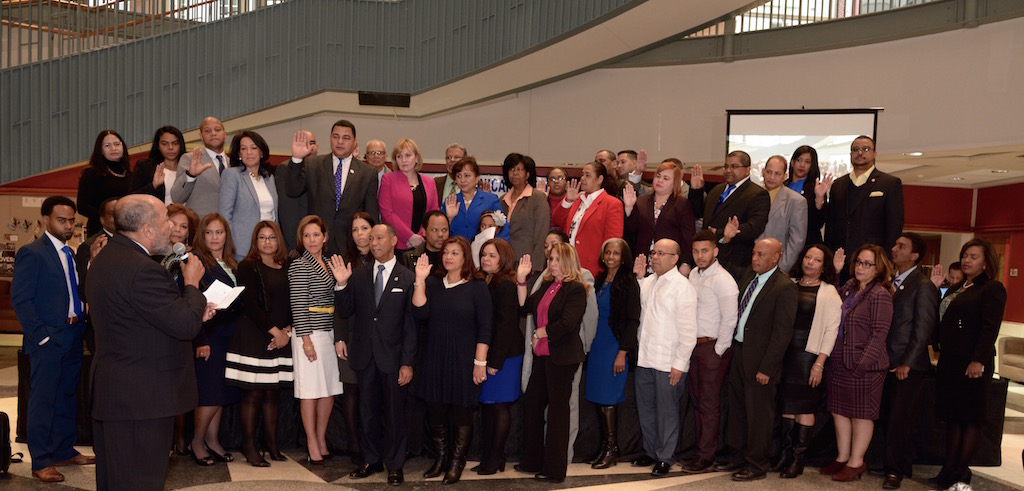
Council members came from Puerto Rico, Pennsylvania, New York, Rhode Island, Massachusetts, Connecticut, Washington, DC, Maryland and New Jersey. NDAC Senior board member Alberto Correa, Ph.D. from Universidad Inter Americana de Puerto Rico offered leadership development training to all participants. A founder of NDAC, Allentown, PA Councilman Julio Guridy outlined the reasons for the founding of the National Council in 2010: “The National Council was founded in response to the plight of many to have a grassroots advocacy organization at the local level and with the mission to advocate for the socio-economic and political advancement of our diverse communities.”
The Luncheon Plenary Session featured a Women Pow-Wow where Florida Representative Daisy Baez urged women to ‘utilize their background and skills when campaigning’, in her particular case, as a veteran of the United States military and ‘proud to have served her country’.
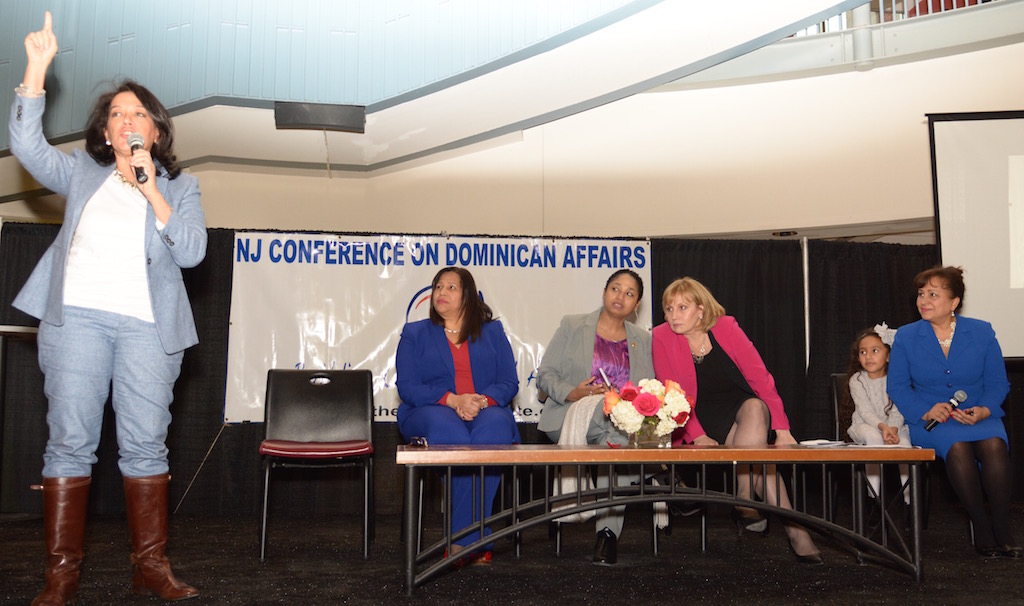
Rhode Island Senator Ana Quezada encouraged women to dare meet a need for representation, because ‘we can’. Maryland Delegate Joseline Pena Melnyk noted that being discouraged from running for the US Congress by the opposition and naysayers would be tantamount to ‘letting them win’; and NJ Lieutenant Governor Kim Guadagno shared her personal success story running for County Sheriff, a traditionally male-occupied position.
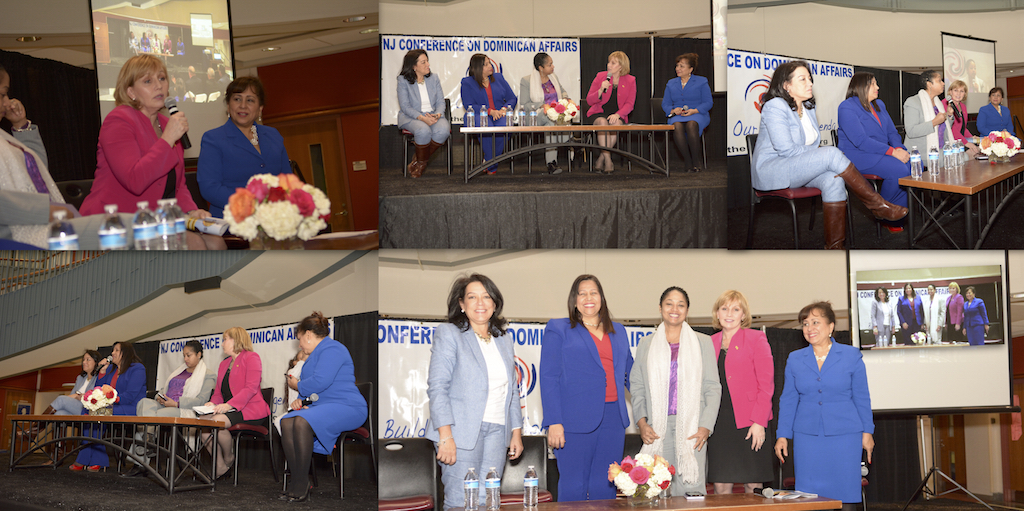
CODA 2017 paved the way for the birthing of a Faith-Based Leadership Training Program to raise awareness about the importance of building a coalition and a network of faith-based leadership, organizations and civic leaders to advance the latino/Hispanic Agenda in their respective communities. The program will be a state-wide and non-denominational initiative to be offered to any religious community and leaders in New Jersey and beyond. The Institute for Latino Studies’ main motivation with this initiative is co-op the Church as an agent of social change. The initiative is spearheaded by Latino Leadership Academy fellows Rev. Cleo Santiago, Rev. Fernando Plaza and Rev. Juan Rosario De La Cruz.
Sociologist Irma Nicasio, Ph.D., who traveled from the Dominican Republic to New Jersey to attend the Conference and to do research work at the Institute for Latino Studies, was interviewed by Nestor Montilla, Sr. for the new film documentary about the true identity of the Dominican people. A one-minute excerpt of the interview is available online via https://www.youtube.com/watch?v=I01jvgoVpr8.
On the film interview, Montilla asked Dr. Nicasio how should Dominicans identify themselves in the United States, considering that some Dominicans are being denied membership in some advocacy organizations due to insufficient blackness or whiteness. She responded affirming the following:
“Dominicans in the United States cannot identify themselves as Indians, light or dark Indians because that is a non-existing racial category. If here in the United States, main racial categories are Black, White, Asian…etc., between Black and White, Dominicans fall under the ‘Negro’ category. In other words, Dominicans’ ethnic and cultural identity is primarily of African descent. Therefore, they fall under the ‘Black’ category in USA.”
During the lunch plenary, the President and Vice President of the Dominican American National Roundtable, Claribel Martinez-Marmolejos and Dr. Miguel Hernandez signed a collaboration agreement with a coalition of health professional organizations. The list of signatory organizations and representatives included the Dominican Medical Association (DMA) NY represented by Dr. Francisco Roa, CEO; Dominican Medical and Dental Society represented by Dr. Juan Tapia; Associacion Hispana de Profesionales de la Salud (AHPS) represented by Dr. Diogenes Fermin, CEO, and Dr. Aritmedes Restituyo, Chairman; Association of Hispanic Healthcare Executives (AHHE) represented by George Zeppentel, Chairman; Colegio Medico Dominicano, Republica Dominicana (CMD) represented by Dr. Leonardo Paula Cabrera; and the Dominican Health Care Association of Florida (DOHCAF) represented by Daisy Baez, Executive Director and founder.
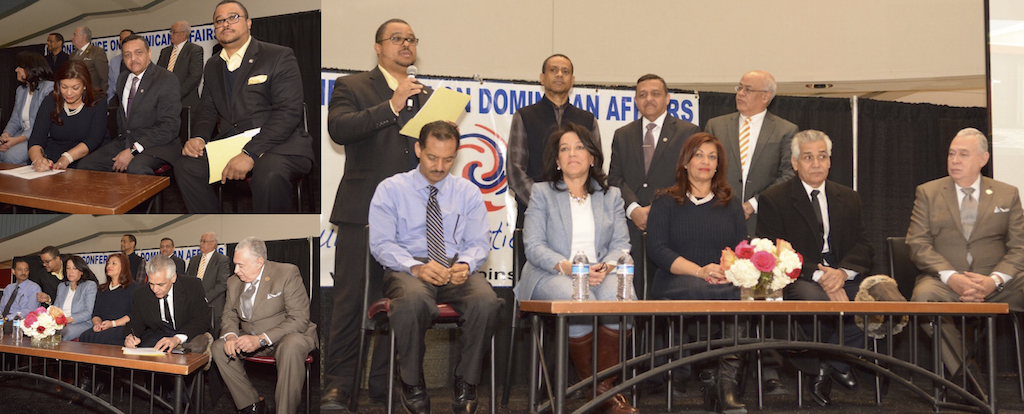
At the Luncheon Plenary, Silvio Torres-Saillant, Ph.D., delivered the 17th Annual Conference on Dominican Affairs’ keynote address entitled The Reality of the Dominican Legacy in USA.
The speech running time is 49 minutes and it’s a MUST WATCH. available online via: https://youtu.be/IjtoWcIWXWk
In thanking the Institute for Latino Studies for the opportunity to be the conference keynote speaker, Dr. Torres-Saillant stated:
“Council’s Chairman Nestor Montilla, Sr., and Institute’s President Maria Teresa Montilla have done me a great honor by asking me to share some thoughts with you as the keynote speaker. I would like to begin by expressing appreciation for the work that Nestor and Maria Teresa have done over the years for people of Dominican descent in the United States.
Through the Council, the Institute and the Dominican American National Roundtable, they have contributed enormously to make Dominicans part of a nation-wide discourse on the future of this country and our place in it as agents of change. It seems to me clear that many of the gains we have made on the electoral markets on the rights of many of our co-ethnics to position of prominence in the municipal, state and federal spheres of government have benefited from the measures of devotion they have invested in creating fora of various sort to advance a dialogue that expands our views of what is politically possible for us as an ethnic community. So I ask for them a warm round of applause.
And among other things, Nestor has established himself as a bonafide historian of Dominicans in public life; unearthing the story of Arthur O. Eve, a retired lawmaker who we now regard as pioneering the Dominican presence in the New York State Legislature having been elected to the Assembly in 1966 and serving for 36 consecutive and productive years.
As a scholar, I deeply appreciate Nestor’s good efforts to help us complete the story of our presence in this country’s political arena.”
Highlights of Dr. Torres-Saillant’s speech include:
▪ Dr. Torres-Saillant renders a rare spellbinding MUST HEAR – MUST WATH keynote speech debunking the narrative of recency used by some characters when talking about the Dominican migratory experience and political empowerment.
▪ There is the false notion that the community consists of quintessential newcomers, who have not paid yet enough dues. The history of Dominicans in USA tells otherwise. Suffices to look at the story of Arthur O. Eve, a retired lawmaker who we now regard as pioneering the Dominican presence in the New York State Legislature having been elected to the Assembly in 1966 and serving for 36 consecutive and productive years.
▪ Dr. Torres-Saillant illustrated the reality and challenges the Dominican Diaspora faces in the United States when attempting to achieve social, economic and political mobility. Made a salient remark about the case of newly elected U.S. Congressman Adriano Espaillat who dared to apply for membership to the US Congressional Black Caucus, which is currently evaluating Espaillat’s application for ‘sufficient blackness’.
▪ Indicated that former Congressman Charles Rangel was a member of such Caucus during his 42-year tenure in the US House of Representatives. If we compare Rangel’s blackness to Espaillat’s as a qualifying requirement to be member of the Congressional Black Caucus, “Nor is Rangel any blacker than Espaillat, because Rangel’s papá was Puerto Rican.” The question then is: WHO’S BLACKER THAN WHOM?
Link to watch speech: https://youtu.be/IjtoWcIWXWk
The Conference on Dominican Affairs (CODA) is made possible thanks to the generous support of UNIVISION, Formé Medical Center, Global Psychiatry Services, PC, and the collaboration of The Dominican American National Roundtable (DANR), Latino Leadership Alliance of New Jew Jersey (LLANJ), Dynamics Multilingual Services, and the National Dominican American Council (NDAC).
CODA is a signature project of the Institute for Latino Studies Research and Development (ILS) www.instituteforlatinostudies.org thelatinoinstitute@gmail.com
About ILS
The Institute for Latino Studies (ILS), founded in 2001, is dedicated to quality research and advocacy for a better society, is a non-profit entity recognized by the federal government as a 501 (c) (3) organization. ILS believes that a solid understanding of cultural identity and people’s socio-economic reality is essential for development in a multi-cultural society. www.instituteforlatinostudies.org

